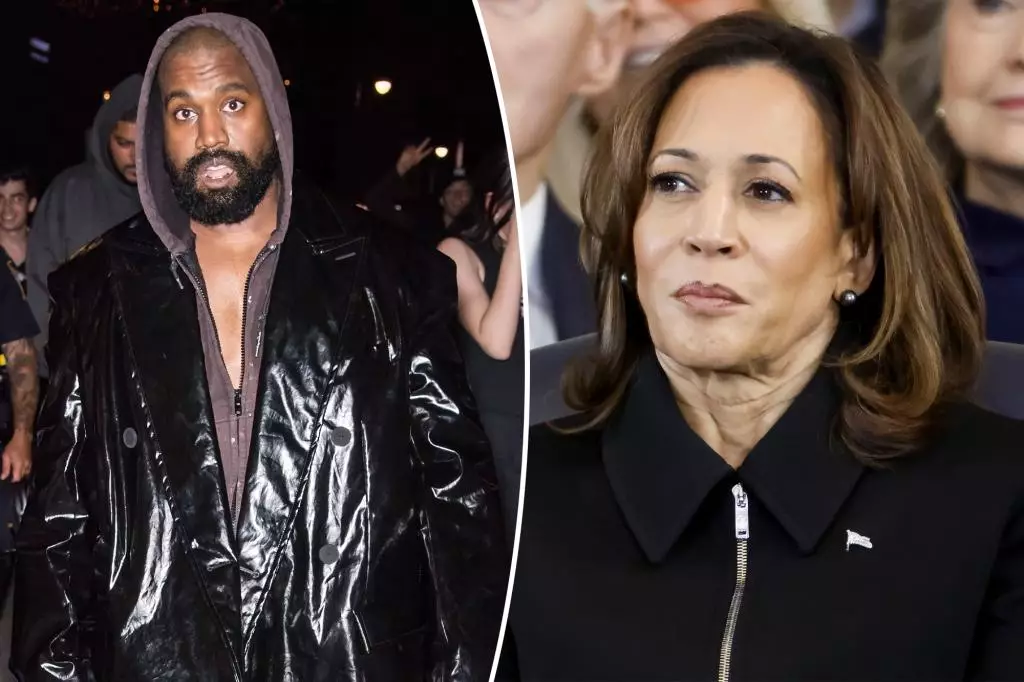Kanye West, a figure synonymous with controversy, has once again captured public attention—not only for his music but also for his provocative social media activity. His recent apology directed toward former Vice President Kamala Harris following a risqué tweet highlights the often-blurred lines between celebrity culture, political discourse, and personal relationships in the public eye. An examination of West’s actions, statements, and underlying context reveals the complexities of navigating fame, accountability, and individual expression.
This incident began when West made a sexually suggestive remark about Kamala Harris just after the former vice president lost to Donald Trump in the 2024 election. The original tweet expressed a personal sentiment that veered sharply into inappropriate and unrestrained territory. “I used to want to f—k Kamala until she lost,” he proclaimed, followed by a dismissive statement about not engaging with “losers.” While he later deleted the tweet and issued an apology, the damage was done; West’s words exposed his thought process and the tenuous grip he has on the realms of humor and propriety.
West’s subsequent posts further complicated his public image. Claiming that Democrats had pressured him to remove the tweet, he nonchalantly declared, “Naw I’m kidding. Dey don’t control black people no more. Trump 4 life.” This comment, laden with racial undertones and political provocation, raises questions about the authenticity of his perceived defiance and his grasp of the broader implications of his words. Is he merely indulging in Twitter antics, or does he genuinely seek to influence political perceptions among his followers?
West’s track record is peppered with instances of disruptive behavior. This is particularly evident in his ongoing feud with pop icon Taylor Swift, which has transformed from a one-off incident into a long-standing narrative arc. Their bitter history traces back to the 2009 MTV Video Music Awards incident, where West infamously interrupted Swift’s acceptance speech. Comments he made in his 2016 track “Famous” further amplified the friction, as he boasted about his perceived power over Swift’s career.
Interestingly, the public’s fascination with their exchanges highlights a cultural phenomenon of celebrity rivalries acting as a lens to explore personal narratives and societal issues. In this case, the animosity and frequent resurfacing of West’s relationship with Swift come to symbolize the chaotic nature of fame, revealing how past grievances can be revisited, reshaped, and even weaponized on social media platforms.
The frequency with which celebrities wield their influence—usually for personal gain or attention—presents a concerning reality for society at large. West’s recent comments about his return to billionaire status and how the “world is lucky to have him” embody the hubris often associated with successful artists. They also raise an important question: Does the unfiltered expression of opinion, particularly from high-profile figures like West, contribute to the normalization of toxic behavior in the public realm?
Moreover, West’s assertion that he is merely a “rich” individual who can say whatever he wants leads to discussions about accountability—namely, whether wealth provides an individual with immunity from backlash. As he steps back into the limelight with nominations at the upcoming Grammy Awards, it begs the question of whether his music and personal conduct will continue to overshadow the persistent call for responsible public engagement by prominent figures.
Kanye West’s recent foray into political commentary and personal relationships through social media reveals a larger narrative concerning celebrity culture. His provocative social media presence serves as a reminder that fame comes with responsibilities; the implications of words spoken, whether in jest or seriousness, can have widespread effects. As his career unfolds alongside his personal quarrels with other artists, the lines between artist, commentator, and individual continue to blur. The ongoing scrutiny of his actions challenges both West and his audience to reflect on the intersection of consequence, behavior, and the cultivated chaos of modern fame.

